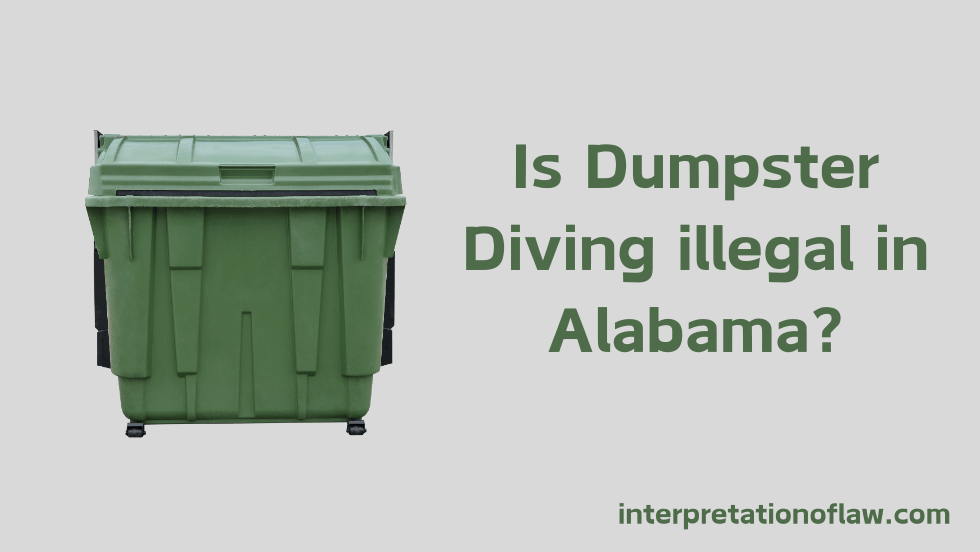Welcome to our discussion about the legality of dumpster diving in Alabama. If you’re unfamiliar with the term “dumpster diving”, it refers to the act of searching through trash or dumpsters for items that may still be useful.
This practice has gained popularity recently as people look for ways to reduce waste and find free goods. If you wan to know about is dumpster diving legal in Alabama, read on to find out more.
What is dumpster diving?
Dumpster diving involves searching through commercial or residential waste containers to find items that are still usable or that can be recycled or repurposed. This practice is not just limited to dumpsters; it also extends to trash bins, garbage bags, and recycling bins. Dumpster divers often look for discarded food, clothing, furniture, electronics, and other goods that can be deemed valuable. Some view the act as a proactive approach to combating excessive waste and consumerism by giving items deemed as trash a second life.
A wide range of personal information can be obtained from discarded materials, including:
- Driver’s license information;
- Social Security numbers;
- Date of birth;
- Handwritten signatures;
- Medical information;
- Bank statements, credit card, and bank A/c numbers.
Why people do dumpster diving?
People engage in dumpster diving for various reasons. Some do it as a means of reducing waste and finding free goods, while others see it as an environmentally friendly way to obtain items without contributing to the production cycle.
For some, it is a form of protest against consumer culture and the excessive production of goods that lead to waste. Additionally, dumpster diving can also be a means of survival for those who are struggling financially.
Realted Post: What Happens If You Get Caught Shoplifting From Walmart?
Is dumpster diving illegal in Alabama?
Currently, there is no specific law that prohibits dumpster diving in Alabama. However, the state has nuisance and trespassing laws that could be applied to dumpster divers. Nuisance laws prohibit individuals from creating a public disturbance or annoyance, which could be interpreted as disturbing the peace by rummaging through trash. Trespassing laws also make it illegal to enter private property without permission, which could apply if a dumpster is located on private property.
Can you legally dumpster dive in Alabama?
In short, yes, you can legally dumpster dive in Alabama. However, some precautions must be taken to ensure you are not breaking any laws. It is essential to avoid causing a disturbance or making a mess while dumpster diving. Additionally, asking for permission before entering private property to access a dumpster is always best. Some businesses may have policies against dumpster diving, so respecting their rules and regulations is important.
What are the laws and regulations for dumpster diving in Alabama?
As mentioned earlier, no specific laws in Alabama prohibit dumpster diving. However, it is essential to be aware of nuisance and trespassing laws that could be applied. Additionally, it is important to respect any rules or regulations businesses or property owners set regarding their dumpsters. It is also worth noting that dumpster diving may be prohibited on government property or areas with high security, such as military bases. It is always best to research and exercise caution when dumpster diving in any location.
FAQs
Is it legal to dumpster dive in Alabama?
Yes, dumpster diving is legal in Alabama, but it’s important to be mindful of local ordinances and the specific policies of businesses when it comes to accessing their waste containers. The key is to avoid any behavior that could be considered trespassing or creating a nuisance.
What is the best day to dumpster dive?
The best days to go dumpster diving can vary depending on the type of items you’re looking for and where you plan to dive. Typically, the day after inventory or a big sale for retail stores can result in more discarded items. The night before or the morning of trash collection day for residential areas can yield the best finds. Always be sure to check local schedules and be mindful of creating any disturbances in neighborhoods.
Why do some people dumpster dive?
Some individuals are drawn to dumpster diving to uncover hidden treasures and valuable items that are mistakenly thrown away. Beyond environmental concerns and financial necessity, the thrill of the hunt and the excitement of discovering something unexpected or unique can be quite alluring. This form of urban foraging can sometimes result in the acquisition of items that can be repaired, restored, or repurposed, thus saving them from landfills and extending their useful life.
Conclusion
So, is it illegal to dumpster dive in Alabama? The answer is no, but there are certain precautions that should be taken to ensure the activity is done safely and legally. Remember to always respect private property and any rules or regulations set by businesses regarding their dumpsters.
Additionally, it is important to be aware of any nuisance or trespassing laws that could potentially apply. Ultimately, dumpster diving can be a fun and beneficial practice when done with caution and respect. So, happy dumpster diving! Remember to reduce, reuse, and recycle. Let’s work together to reduce waste and protect the environment.
References
- “Dumpster Diving Laws” by LegalMatch Law Library. (https://www.legalmatch.com/law-library/article/dumpster-diving-laws.html)
- “Is Dumpster Diving Illegal?” by FindLaw’s Blotter. (https://blogs.findlaw.com/blotter/2013/05/is-dumpster-diving-illegal.html)
- “Dumpster Diving for Food in Alabama” by LegalMatch Law Library. (https://www.legalmatch.com/law-library/article/dumpster-diving-for-food-in-alabama.html)
- “Is Dumpster Diving Illegal?” by The Balance Small Business. (https://www.thebalancesmb.com/is-dumpster-diving-illegal-398695)
- “Dumpster Diving Laws in Alabama” by Legal Beagle. (https://legalbeagle.com/8469545-dumpster-diving-laws-alabama.html) End of Content.

Carter Wilson is a licensed lawyer with over 10 years of experience in various legal fields. He is passionate about making law accessible to the general public and helping individuals navigate through complex legal matters.

